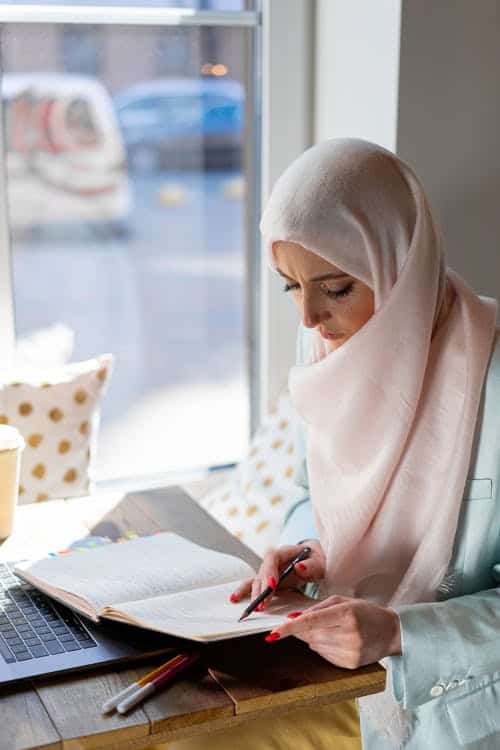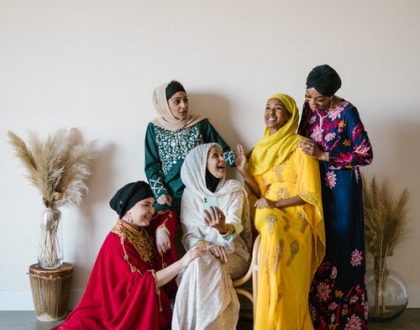Blocking the haram. The command to lower the gaze and to wear the hijab in Surah An Nur


Surat An Nur is a surah full of etiquettes.
Knocking before entering
One of these etiquettes is to seek permission before entering someone’s house, which is known as istidhan. Before you enter anyone’s house, knock on their door, or call out ‘Asalamalaikum’ if there is no door, call the people of the house.
O believers! Do not enter any house other than your own until you have asked for permission and greeted its occupants. This is best for you, so perhaps you will be mindful.
If you find no one at home, do not enter it until you have been given permission. And if you are asked to leave, then leave. That is purer for you. And Allah has ˹perfect˺ knowledge of what you do.
There is no blame on you if you enter public places where there is something of benefit for you. And Allah knows what you reveal and what you conceal. (24:27-29)
If there is no one home, you are not allowed to enter unless you have their permission. If you are told to leave, leave as it is better. They may not be ready to receive you for a variety of reasons and it is not your business why they could not receive you, if you have no appointment.
If you had an appointment and they were unable to receive you, leave without any hard feelings in your heart.
Thus Allah is showing us the etiquettes of dealing with each other, drawing the boundaries and protecting everyone their rights.
Blocking the gates to haram
This surah deals with accusations and the topic of zina (sexual intercourse outside of permitted relationships) we see the deep lesson, as Allah does not only prohibit what is harmful, but He prohibits the paths that lead to that prohibition, for our protection.
Therefore Allah made zina haram, as well as everything that leads to zina. The closer to zina something is, the more prohibited it is.
˹O Prophet!˺ Tell the believing men to lower their gaze and guard their chastity. That is purer for them. Surely Allah is All-Aware of what they do. (24:30)
Allah has given the command here that believing men should lower their gaze, and then Allah commands women to lower their gaze and guard their chastity. Why? Because zina does not happen without first looking and liking something and then planning then executing. It begins with looking.
We can see that Allah is closing the gates of everything which leads to zina.
Lowering the gaze
The etiquettes of lowering the gaze are being addressed in this surah.
Allah Almighty commanded women to go beyond lowering her gaze. He commanded her to concel her beauty.
And tell the believing women to lower their gaze and guard their chastity, and not to reveal their adornments except what normally appears. (24:31)
Women are to conceal anything except what cannot be concealed, for instance, she cannot hide her dress with a dress, and then that dress with another dress. Her dress should therefore be loose, not short, not clinging to her shape or transparent, or revealing her awrah (nakedness). Her dress does not have to be a particular style or colour, it depends on the urf (culture, traditions and local customs) where she resides.
The hijab / khimaar
Let them draw their veils over their chests, and not reveal their ˹hidden˺ adornments (24:31)
Allah Almighty commands women to draw their veils, known as the khimaar over their chests. At that time, living in the desert, it was common for men and women to protect themselves from the dust and sand by covering their heads. Islam tweaked this culture by extending the head-covering women wore over their chest, which was often left exposed.
Those who claim there is no ayah in the Quran which says the hijab is an obligation, will find it here. The word khimaar is the Quranic terminology for hijab as we understand it today. It is linked to the word khamr which is the word for intoxicant, because it is something which veils the intellect when it is consumed.
The word hijab is used in the Quran to mean a barrier.
The very opening of the surah states that the commands revealed in this surah are obligatory.
˹This is˺ a surah which We have revealed and made ˹its rulings˺ obligatory, and revealed in it clear commandments so that you may be mindful. (24:1)
Then Allah Almighty lists the people whom women can reveal their beauty to:
their husbands, their fathers, their fathers-in-law, their sons, their stepsons, their brothers, their brothers’ sons or sisters’ sons, their fellow women, those ˹bondwomen˺ in their possession, male attendants with no desire, or children who are still unaware of women’s nakedness. (24:31)
Therefore women are permitted to show their beauty to their mahrams, such as their fathers and brothers.
Allah is teaching us how to stay away from anything that leads to haram. We ask Allah to keep us away from any doubtful matters and anything that leads to haram. Ameen.
Shaykh Haytham Tamim – Ramadan day 7

Do support us with your duas and donations and enable us to continue spreading free content through our regular blogs, live sessions and videos.
- The truth is more powerful than lies
- Does a bride’s wali have to be Muslim?
- Is is permissible to lead a salah split over different rooms?
- Global IT outage. When systems go down…
- The concept of worship. What are ibadah and ihsan – and how do they lead to self development?



